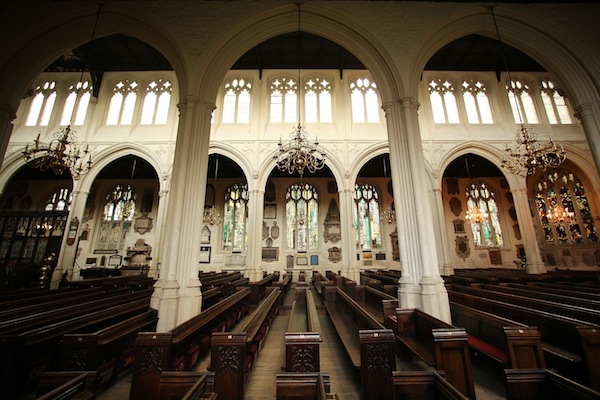According to my colleague Melanie McDonagh (Spectator 21st June), religion makes you happy and churchgoing is good for you. Crikey, you could have fooled me.
For sure, an ancient church or cathedral is a peaceful and moving place to visit. Religious music can also be very affecting — I love Haydn’s many masses and adore Rossini’s Petite Messe Solennelle — as can be its art. But, as the man said when looking at some vast triptych of the Crucifixion, ‘Great story, shame it ain’t true.’
I was confirmed into the Church of England when I was seventeen. I had agonised about this for ages and was a good three or four years older than my fellow confirmands.
To mark the occasion, my godmother gave me a beautiful Omega Seamaster watch engraved with the date – 20th November 1977 – which I wear to this day. My father wrote me a postcard.
‘Dear boy,’ it ran. ‘Your mother is surprised and pleased to hear that you are getting confirmed. I am surprised. Yours ever, Pa.’
My dad was the grandson of a rabbi and had become a convinced atheist at an early age. My ma, on the other hand, is a proud daughter of a rural dean and, without being showy, remains a keen if irregular churchgoer.
All this made for some spirited discussions at home with me, an anxious, parent-pleasing only child caught in the crossfire.
My father explained that since he considered all religions to be ‘complete and utter mumbo-jumbo’ I would understand why he couldn’t come to my confirmation. To his eternal credit, however, he stood outside the school chapel for the duration of the service and presented me with a chilled bottle of Veuve Clicquot and a bear hug when it was all over.
I had been prepared for confirmation by the Rev Roger Royle, a great man who listened patiently to my doubts and concerns. He was a warm and wise tutor. He also told great jokes, my favourite one concerning Moses’s lengthy negotiations with God over the Commandments. The joke ends with Moses telling the Children of Israel: ‘Guys, I have good news and I have bad news. The good news is that I beat Him down to ten. The bad news is adultery’s still in.’
Thanks to Rog’s good offices, I eventually was confirmed and tried to live a Godly life thereafter, saying my prayers and being a good boy. I was perpetually beset by guilt, though, and anxiety that I wasn’t measuring up.
The beginning of the end for me as a good Christian occurred in Ireland on a visit to my then girlfriend’s parents. Much to my parents’ delight, my girlfriend and I had moved in together. Her parents, though, were far from delighted when they found out (my girlfriend had tried to keep it secret from them), and her father wrote to me a fire and brimstone letter after our visit.
‘It pains me to say this, Johnny, since you are a nice guy, but it’s a fact that you are going to die a long and painful death in hell fire. And worse than that, you are leading my daughter to the same fate. I must ask you to desist.’
That set the cat amongst the pigeons.
A year or so later, my father died and I was struck how brave and defiant an atheist he was to the bitter end. ‘Get that bloody thing out of here,’ he said to the well-meaning nurse who sought to comfort him by bringing a Bible to his death bed.
Both these events had a great effect on me and I had whatever is the reverse of a Damascene Conversion. It had become blindingly clear: there is no God. We are alone and just blooming well have to get on with it.
I felt a vast weight lift off my shoulders. Suddenly I was free of the ghastly guilt and anxiety that I had felt for years. My old man had been right all along. I had never felt happier or freer. Life looked rosy again.
But, back to that Omega watch I mentioned, given to me by my adored and adoring godmother. It’s the damnedest thing and absolutely true (and provokes much merriment amongst my Christian friends), but the only time the watch has ever stopped in almost forty years was the day that I decided there was no God.
Jonathan Ray is The Spectator’s Wine columnist







Comments